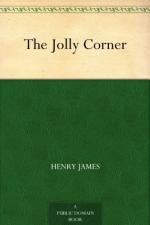She had come with him one day to see how his “apartment-house” was rising; he had helped her over gaps and explained to her plans, and while they were there had happened to have, before her, a brief but lively discussion with the man in charge, the representative of the building firm that had undertaken his work. He had found himself quite “standing up” to this personage over a failure on the latter’s part to observe some detail of one of their noted conditions, and had so lucidly argued his case that, besides ever so prettily flushing, at the time, for sympathy in his triumph, she had afterwards said to him (though to a slightly greater effect of irony) that he had clearly for too many years neglected a real gift. If he had but stayed at home he would have anticipated the inventor of the sky-scraper. If he had but stayed at home he would have discovered his genius in time really to start some new variety of awful architectural hare and run it till it burrowed in a gold mine. He was to remember these words, while the weeks elapsed, for the small silver ring they had sounded over the queerest and deepest of his own lately most disguised and most muffled vibrations.
It had begun to be present to him after the first fortnight, it had broken out with the oddest abruptness, this particular wanton wonderment: it met him there—and this was the image under which he himself judged the matter, or at least, not a little, thrilled and flushed with it—very much as he might have been met by some strange figure, some unexpected occupant, at a turn of one of the dim passages of an empty house. The quaint analogy quite hauntingly remained with him, when he didn’t indeed rather improve it by a still intenser form: that of his opening a door behind which he would have made sure of finding nothing, a door into a room shuttered and void, and yet so coming, with a great suppressed start, on some quite erect confronting presence, something planted in the middle of the place and facing him through the dusk. After that visit to the house in construction he walked with his companion to see the other and always so much the better one, which in the eastward direction formed one of the corners,—the “jolly” one precisely, of the street now so generally dishonoured and disfigured in its westward reaches, and of the comparatively conservative Avenue. The Avenue still had pretensions, as Miss Staverton said, to decency; the old people had mostly gone, the old names were unknown, and here and there an old association seemed to stray, all vaguely, like some very aged person, out too late, whom you might meet and feel the impulse to watch or follow, in kindness, for safe restoration to shelter.




